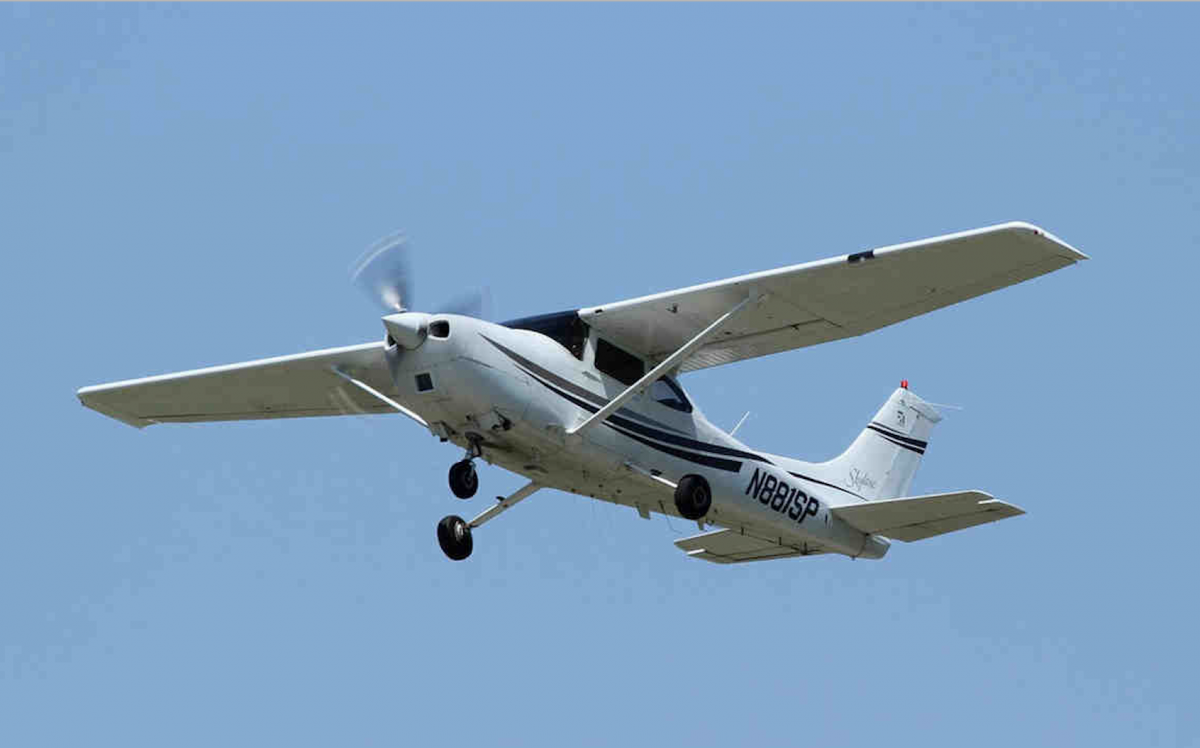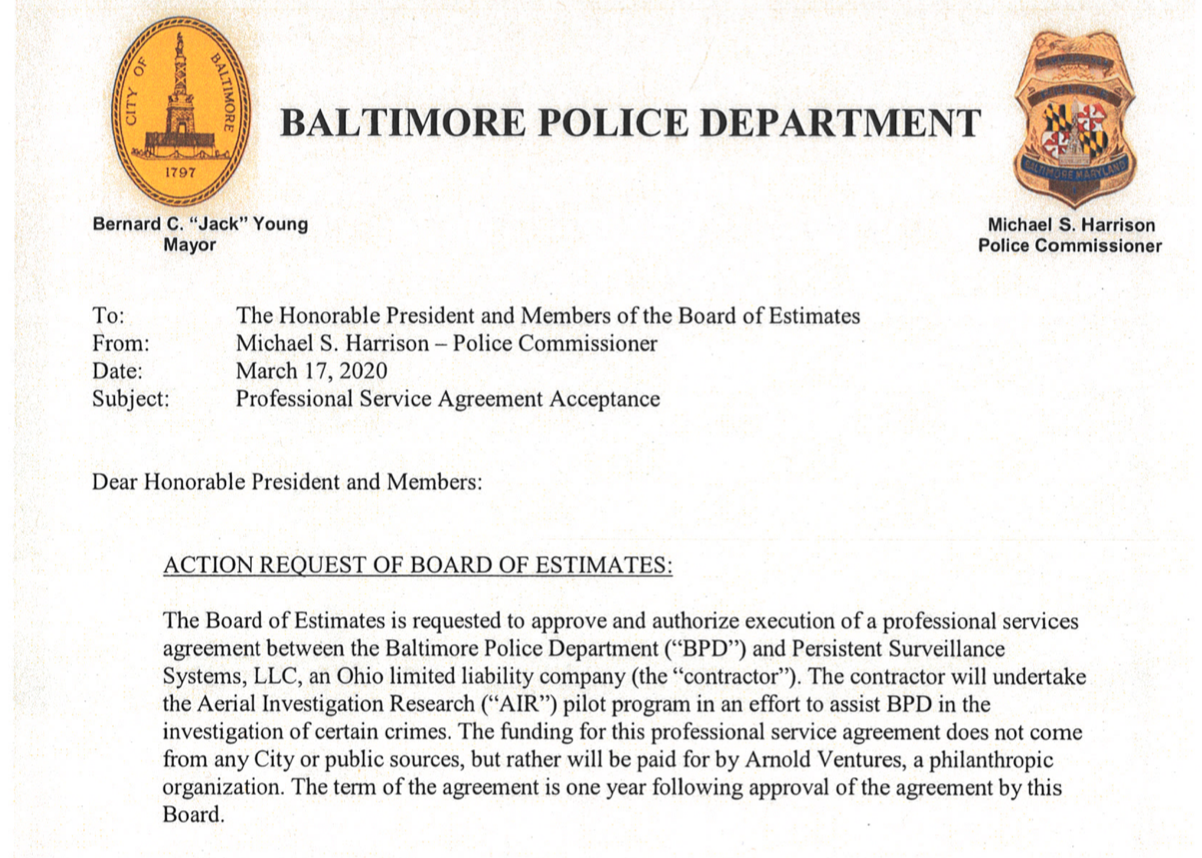
This article was produced in partnership with the Pulitzer Center.
A U.S. District Court judge is set to rule by Friday on an ACLU lawsuit that seeks to block the Baltimore Police Department from using airborne surveillance images via the city’s controversial Aerial Investigation Research (AIR) pilot program.
Three privately funded planes would fly over Baltimore, up to 84 hours weekly, for six-months under a contract between the Ohio-based Persistent Surveillance Systems and the Baltimore Police Department, beginning in May. The planes, equipped with a sophisticated 192-megapixel full-color camera system (named HawkEye), would capture images of people’s outside movements on Baltimore streets and sidewalks, as well as their own backyards, according to ACLU and police department legal briefs focused on the constitutionality of the program.
The city’s Board of Estimates approved the contract and pilot project now in federal court by a 3-2 vote three weeks ago. Mayor Bernard C. “Jack” Young, who controls the majority of votes on the Board of Estimates, voted to greenlight the initiative. City Council President Brandon Scott, among those running against Young for mayor in upcoming Democratic primary, does not support the surveillance program—or “spy planes”—as the effort is often derided.
The stated objective of the initiative is to help the Baltimore Police Department investigate murders, shootings, armed robberies, and carjackings with collected surveillance images. Baltimore, which has witnessed more than 300 homicides in each of the last five years, is essentially serving as a test case for potentially similar surveillance initiatives in other cities, the ACLU says.
Baltimore City has become a constitutional battleground for national public privacy issues.
The constitutional and civil rights dispute coincides with the fifth anniversary of Freddie Gray’s death from injuries suffered while in police custody on April 19, 2015, with subsequent riots and weeks of protests. The following year, as city anti-police brutality activists protested a not-guilty verdict handed down for police officer Caesar Goodson, Jr.—the driver of the van in which Gray was detained—aerial surveillance was being secretly conducted by the same company and Baltimore Police Department.
That publicly undisclosed program, first reported by Bloomsberg Businessweek after a tweet inquiring about the strange constant circling of planes overhead, was halted in 2016 amid criticism of its secrecy and condemnations from civil liberties advocates who made the case that the system represents a sweeping overreach of surveillance that violates individuals’ rights.
Anyone know who has been flying the light plane in circles above the city for the last few nights? — Scan Baltimore (@scanbaltimore) May 3, 2015
The new effort has already run test flights to collect aerial imagery as part of the program’s restart, court filings show. But the BPD agreed to temporarily suspend any current flights while awaiting the federal ruling expected by the end of this week. Meanwhile, Baltimore City has become a constitutional battleground for national public privacy issues.
If sanctioned by the federal court, Baltimore would become the first U.S. city to formally approve and implement military-style technology known as Wide Area Persistent Surveillance in an effort to fight crime, likely opening the door for further surveillance programs in Baltimore and elsewhere.
“What happens here would set a precedent for what happens in the rest of the nation,” Jay Stanley, a senior ACLU national policy analyst, said during an ACLU virtual press conference earlier this month. “This is one of the biggest privacy issues I’ve seen come down the pike.”
David Rocah, an ACLU of Maryland senior staff attorney, went further, comparing the effort to those found in dystopian novels. “Baltimore’s spy plane program, or Wide Area Persistent Surveillance, is an Orwellian nightmare come to life,” Rocah said.
In a flurry of legal briefs, motions, and responses filed last week, ACLU and Baltimore Police Department lawyers argued whether such aerial surveillance violates the U.S. Constitution’s First Amendment, an individual’s right to free speech and assembly, and the Fourth Amendment—primarily the freedom from government searches deemed unreasonable under the law.
Under the proposed pilot, aerial cameras would collect imagery data up to 12 hours a day over “major portions” of the city, weather permitting, with “a resolution of roughly one pixel per person,” according to the BPD. Such images could be checked against other city surveillance technologies, including CitiWatch cameras, license plate readers, and a web of visual data police say could identify the suspects or witnesses present at a crime scene.

Police leaders contend today’s AIR pilot program would ensure privacy limits and transparency, partly via potential “robust independent” evaluations by Morgan State University, the RAND Corporation, and University of Baltimore.
Baltimore’s police department has a documented, long-troubled civil rights history. A U.S. Department of Justice report in 2016 found the BPD engaged in patterns of conduct that violated the Constitution’s First and Fourth Amendments, leading to a consent decree detailing reforms. Such reforms emphasize building a “bond of trust” between the community and police.
Erricka Bridgeford, co-founder of the Baltimore Ceasefire project and a plaintiff in the ACLU lawsuit, believes the AIR program would further erode community trust, and that aerial surveillance will hinder community outreach efforts. “[The police department] should not have access to advanced technology,” she said, that creates an opportunity “to violate people’s rights. Also, I think it undermines the work that good officers are trying to do in the community.”
On Tuesday, a Morgan State survey reported city residents’ widespread dissatisfaction with police.
BPD has said the pilot program would comply with the consent decree. Under the contract, Persistent Surveillance Systems will analyze captured images when requested by police for investigations into targeted, violent crimes. Collected images can be scanned backward and forward in time. The BPD says it will not conduct live surveillance day-to-day in coordination with the company operating the planes. That said, Baltimore Police Commissioner Michael S. Harrison also has discretion to request data analysis under “extraordinary and exigent” circumstances.
“Though the program’s objectives to reduce crime and violence are laudable, the Constitution dictates that this all-seeing and ever-present ‘eye in the sky’ is not an available solution.”
The ACLU contended in its request for a preliminary injunction earlier this month that the program would create “the most-wide reaching surveillance dragnet ever employed in an American city, giving the BPD a virtual, visual time machine whose grasp no person can escape.”
The century-old civil rights organization said that “though the program’s objectives to reduce crime and violence are laudable, the Constitution dictates that this all-seeing and ever-present ‘eye in the sky’ is not an available solution.”
Baltimore Police Department attorneys have countered by citing past court rulings on aerial photography use in investigations, most from the 1980s prior to recent advances in technologies. In response to the ACLU suit, BPD emphasized program support by several local churches and a city “level of violent crime that has reached tragic proportions,” including 348 homicides in 2019. BPD called the aerial surveillance “simply a creative, technological assist.”
The estimated nearly $3.7 million cost of the pilot would be funded by Arnold Ventures, a limited liability corporation founded by Texas philanthropists John Arnold, a former Enron executive and hedge fund manager, and his wife, attorney Laura Arnold. Future costs or funding support remain unclear.
Former Baltimore mayor Sheila Dixon, who is running again for mayor, supports the surveillance plane pilot. Former city police department spokesman T.J. Smith, former state deputy attorney general Thiru Vignarajah, and former U.S. Treasury official Mary Miller—all running for mayor—support the pilot program. The Arnolds have made significant contributions to Vignarajah’s campaign.
“It is not BPD’s burden to show that the AIR program is constitutional at this stage,” Baltimore Police Department attorneys argued in their filing, noting the city is already surveilled by police helicopters, speed and red light cameras, as well as CCTV, CitiWatch, and the private security systems in nearly every neighborhood. “Observations of public movements are expected in Baltimore,” police department attorneys stated. “It cannot be that the public recognizes the abundance of cameras potentially capturing their activities in the public thoroughfare and still maintains a ‘reasonable’ expectation of privacy.”
The ACLU says aerial surveillance that spans up to 90 percent of the city is unique and goes too far.
“Yes, you are traveling public roads, but this program tracks all of it on a widespread scale,” Ashley Gorski, a staff attorney with the ACLU National Security Project, said in a recent interview. “The government can do this if it gets a warrant, but there’s no warrant that can be authorized for that kind of collection for 600,000 people in the city.”
“The government is capturing the whole of an individual’s movements,” Gorski continued. “They can capture everything you are doing, exposing the privacy of how you live your life, if you go to the pharmacy or a gay bar or an Alcoholics Anonymous meeting.”
“[The government can] capture everything you are doing, exposing the privacy of how you live your life, if you go to the pharmacy or a gay bar or an Alcoholics Anonymous meeting.”
On a broader legal scale, the court battle reveals how case law and U.S. Constitution interpretations often lag behind rapidly changing technologies.
Central to the ACLU’s argument is a 2018 U.S. Supreme Court case, Carpenter v. United States, which ruled that police access to a person’s cell phone location data without a warrant violates the Fourth Amendment. The Baltimore Police Department argues that cell phone tracking (via data generated when a mobile phone communicates with a cell tower) is not the same as aerial surveillance. Wide Area Surveillance cameras in general, however, have a range of capabilities, including the ability to capture higher resolution, zoom, and long-term real-time images, as outlined in a U.S. Department of Homeland Security report.
Such technologies can also be used via drones.
The ACLU says it understands crime-fighting concerns, yet also sees widespread potential for abuse.
“The city is fearful, feeling like there are a lack of viable solutions to the crime problem, so people are turning to technology to be a panacea,” Gorski said. “But the costs are far too high.”
J. Cavanaugh Simpson is a freelance journalist based in the Baltimore area. This article was supported in part by a reporting grant from the Pulitzer Center. Simpson can be contacted via Twitter @JoCavanaughSim1.
